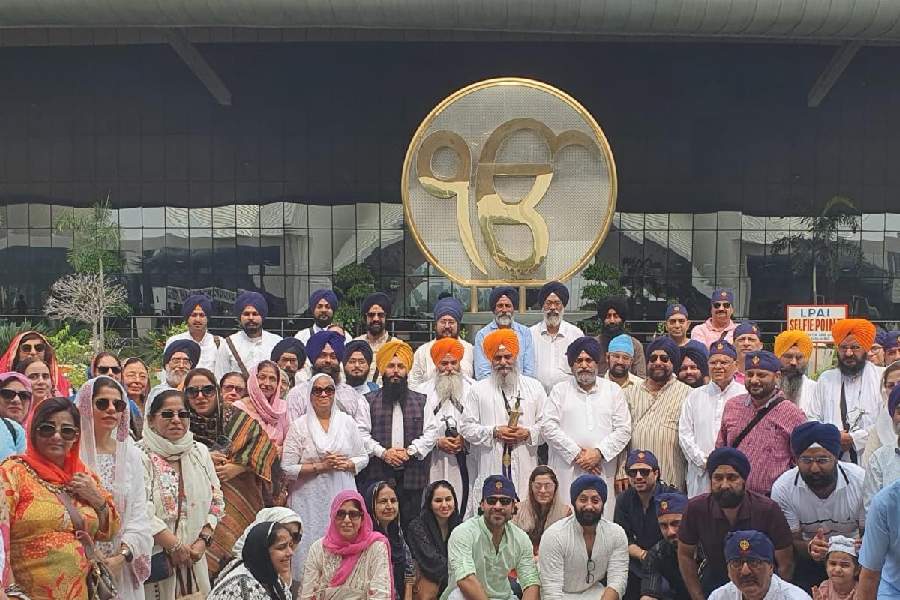Pakistan wants one of its Sikh shrines to be a symbol of universal brotherhood, an administrator in the neighbouring country told a group of Indian visitors last month.
The Indian contingent spent a day at Gurdwara Darbar Sahib in Pakistan, via the Kartarpur corridor, on September 22.
The Kartarpur corridor, opened in 2019, links Gurdwara Darbar Sahib in Pakistan, where Sikhism founder Guru Nanak Dev lived and died at the start of the 16th century, to Dera Baba Nanak shrine in Punjab's Gurdaspur district.
The 4km corridor provides visa-free access to Indian pilgrims to visit Gurdwara Darbar Sahib.
The visit, the second such trip in two years, stands out against the atmosphere of animosity between the neighbours created by radicals on both sides.
Many of the visitors were from Calcutta. Apart from Sikhs, the 150-member team had members of the Sindhi community and Bengali Hindus.
The jatha (delegation) was received by Sardar Ramesh Singh Arora, the ambassador-at-large for Kartarpur corridor and a former member of the Punjab Assembly in Pakistan, and members of the Pakistan Sikh Gurdwara Parbandhak Committee.
He told the members of the delegation that such visits would go a long way in establishing Kartarpur as a "symbol of universal love and brotherhood".
Arora was appointed to the honourary post of ambassador-at-large in March by Pakistan's then Prime Minister, Shehbaz Sharif.
The management of the Kartarpur corridor is the responsibility of a project management unit (PMU) which works under Pakistan's ministry of religious affairs and interfaith harmony.
"The PMU was set up because the federal government wanted the Kartarpur corridor to go beyond a religious place. It is a symbol of unity and understanding among people of various backgrounds who come together to honour Guru Nanak's teachings," Arora told this newspaper in a message.
The journey — organised to "spread the message of unity and brotherhood" — was called Kudrat Ke Sab Bande, which means all of us trace our origins to one Almighty.
The hospitality manifested itself in various ways. Not one elderly member had to carry her own luggage.
"There is so much talk of animosity between India and Pakistan. But in the time I spent at Gurdwara Darbar Sahib, I felt no difference between Indians and Pakistanis," said Pramiti Gupta, who went from Calcutta.
Satnam Singh Ahluwalia, general secretary of Gurdwara Behala, was a leader of the Calcutta contingent on the trip.
He said: "As a representative of a minority community, I was very impressed by the importance that Pakistan has accorded to the Kartarpur corridor. It is a shining example of the preservation of minority heritage...."
On September 22 morning, the trip started from Golden Temple. The delegation, travelling in four buses, reached the Dera Baba Nanak shrine on the Indian side in less than 90 minutes.
The members spent a few hours at the Gurdwara Darbar Sahib, taking part in prayers and interacting with the devotees of the neighbouring country.
"As we crossed the border, we witnessed the unifying thread that binds humanity together," Ahluwalia said.
Murli Punjabi, secretary of the Sindhi Panchayat in Calcutta who was part of the trip, said: "We felt at home, close to our roots."
